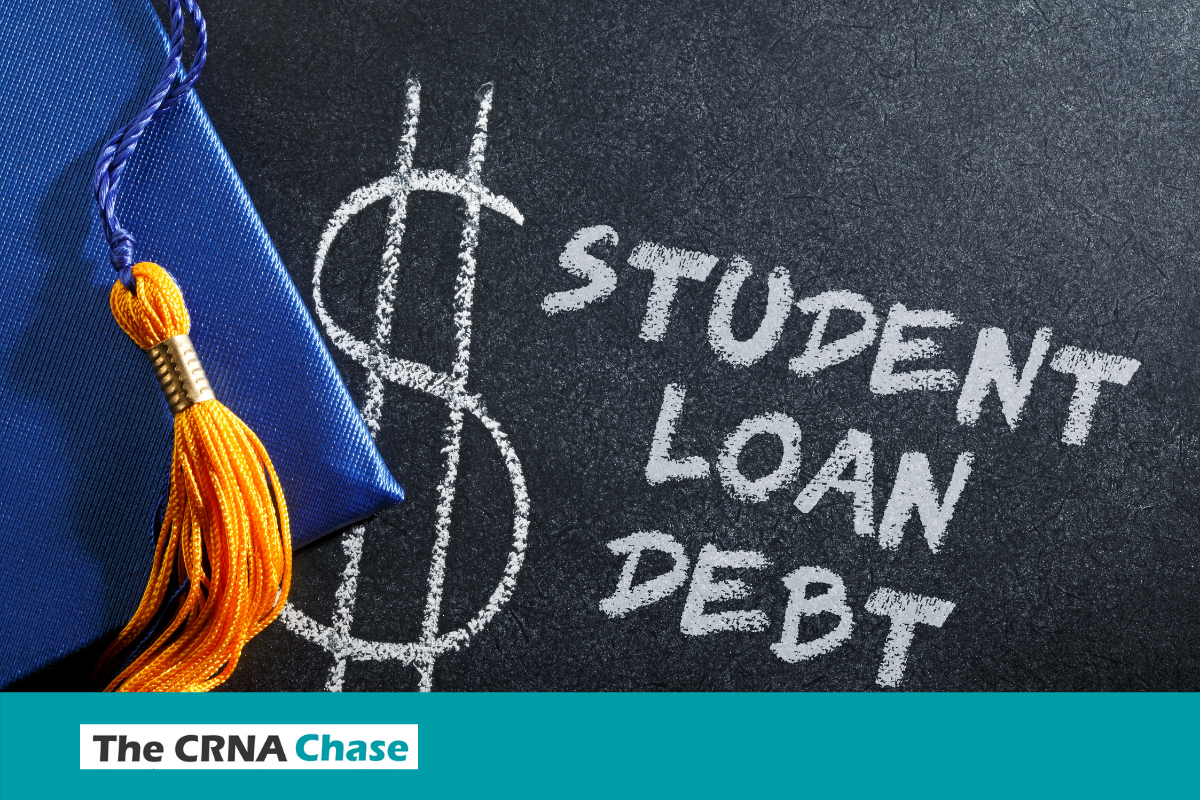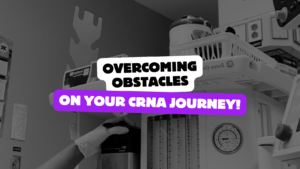Yes, you really can get a Grad PLUS loan if you have a bad credit score. And did you also know there is no specific loan limit on how much money you can borrow using the Grad PLUS Loan.
I know this sounds awesome and like music to your ears. Especially since most of you will likely rely on Grad PLUS loans to pay for your CRNA school education.
But let’s not forget this ONE important thing. The interest rate on Grad PLUS loans for graduate students isn’t just ridiculously high, it also accumulates while the student is enrolled in school.
There is so much I didn’t know until it was time to apply for financial aid, but below is a deep dive into what all the Grad PLUS loan entails.
What are Grad PLUS Loans?
Before going all in, let’s look into what a Grad PLUS Loan is exactly.
Although Grad PLUS loans are still considered federal student loans it will require a separate application as it is slightly different from other federal and private student loans. This loan is for students who have maxed out on their Direct Unsubsidized Loan which is another type of federal student loan.
Who qualifies for Grad PLUS loans?
To put it simply, the U.S. Department of Education provides Grad PLUS loans to graduate or professional students to cover their educational expenses. And of those students they must meet the following requirements:
- Must be enrolled at least half time at an eligible and accredited college or program
- Have no adverse findings on their credit report
- Must be enrolled in a program which leads to a graduate/ professional degree or certificate
- Must meet the general eligibility requirements which involves showing you have financial need, be a U.S. citizen or eligible non-citizen.
What credit score do I need for a Grad PLUS loan?
So, I guess you figured out that a credit check will be run when you apply for a Grad PLUS Loan. While this is certainly correct, there isn’t any specific credit score that the applicant needs to have. This is done to see if you have any adverse credit history. So if you have any adverse credit history, you will have to prove you are eligible for a Grad PLUS Loan.
What is considered adverse credit history?
Now if “adverse credit history” made you swallow hard, you may be thinking what exactly does this include. Here are some things considered as adverse credit history:
- You have one or more debts totaling in all more than $2085 and 90 days past due
- Bankruptcy
- Foreclosure
- Repossession
- Tax liens
- Wage garnishment
- Write- off of a federal student aid debt
If your Grad PLUS application is denied due to adverse findings on your credit report, you could still qualify for a loan by using a cosigner. And if this is not possible you may be able to provide documentation showing extenuating circumstances in regards to your credit history.
I have first hand knowledge of being rejected due to adverse credit. In my last year of CRNA school, my husband forgot to pay our income taxes and it showed up on my credit report.
As a result, my Grad PLUS application was denied. I’m not going to lie I could have strangled my husband and I was in straight panic mode! But once it was paid, I was able to show receipt of payment and they approved it within a week or so.
What does the Grad PLUS loan cover?
The amount you receive from the Grad PLUS loan is the cost of attendance which is determined by the school minus any other financial assistance you receive such as scholarships, fellowships, grants, etc.
The cost of attendance is calculated based on direct costs and indirect costs and includes:
Direct costs
- Tuition and fees
- Room and board
Indirect costs
- Books and supplies
- Technology and equipment
- Transportation
- Miscellaneous and personal expenses
And as I stated above there are no maximum loan limits which is why you see some CRNA students come out of CRNA school owing upwards of $300,000.
How to Apply for a Graduate PLUS Loan?
Now that you know the basics of the Grad PLUS loan, it’s time to apply. Once you get accepted to CRNA school and meet the rest of the qualifications, you must first complete the Federal Application for Federal Student aid (FAFSA) form. Completing this form is not just for the Grad PLUS loan but it also qualifies you for other types of aid like scholarships, grants and other federal student loans.
After submitting the FAFSA form, you can start on the Direct PLUS Loan application for graduate students. The application time should be no more than 20-30 minutes. Here you will need your verified FSA ID (username and password created when you filed your FAFSA), school will be attending, your permanent mailing address, phone number and email address.
If you qualify for the loan, you’ll need to agree to the terms of the loan by signing a Promissory Note. In addition to completing entrance counseling.
Other ways to pay for CRNA school?
While most graduate students will have no other choice than to rely on Grad PLUS loans, there are some other options out there. Such as:
- Before doing anything look for scholarships and fellowships
- Personal savings
- Another option is for your current employer to pay for your education. It worked for my fellow CRNA partner. All she did was ask them if they would pay for it in exchange for her staying there 5 years after she graduated from CRNA school.
- Withdraw from your 401 K or retirement fund.
- Direct Unsubsidized also available through the Department of Education up to an annual loan limit of $20,500.
- And private student loans of course from various lenders. You’ll need to compare interest rates and loan limits. Also keep in mind there may not be any payment deferrals like with the loans through the Department of Education.
Bottom Line
The reality is the majority of nurse anesthesia students will have to finance their education due to the huge expense of CRNA school. However, your first option should not be to take out a ton of student loans to pay for your education unless you have no other choice.
But in order to do this you must have a plan and budget in place which will give you peace of mind and allow you to focus more on your studies than your expenses. Check out these ways realistic ways to track your spending. Basically you need to become financially literate.
P.S. If you are still trying to figure out how in the world will I ever be able to afford CRNA school. Be sure to join CRNA Chase ACADEMY for help formulating a financial plan and budget today!








